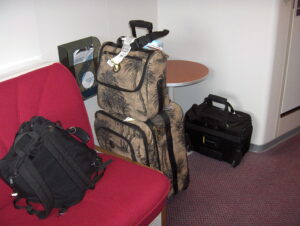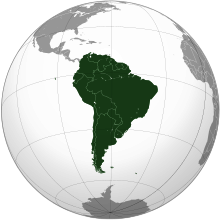Posts Tagged ‘chile’
» posted on Thursday, December 31st, 2020 by Linda Lou Burton
I Haven’t Had a Bean in Weeks
Originally posted December 31, 2005 by Linda Lou Burton from Lima, Peru – Seating roulette. Interesting how it’s played. Boarding in Santiago, expecting the window seat this time for sure, I found myself once again in the center, but on the aisle. Ah, no one in the center seat. Could I be so lucky as to have a little room? First switcheroo – girlfriend moved from elsewhere to sit by guyfriend, assigned the other aisle seat. Center seat, now taken. I clamped my elbows closely to my side. Anything sticking into the aisle would get chopped off at the nub, for sure.
Across the aisle from me, two newly-marrieds, doing the Versace stroke. They had a window view, but they pulled down the shade. Behind them, two empty seats. I waited, pounce ready. Before I could blink, a little girl moved from behind me and stretched out in those two seats, ready to sleep. Her window shade also was closed.
Oh well I’ll entertain myself with the GPS map, I thought. Alas, no such feature on this plane. No screen, no games, no room, no air. For five cents I would be miserable. But it’s almost the New Year. We’ll celebrate! Every time zone! Yea! Airbound at last.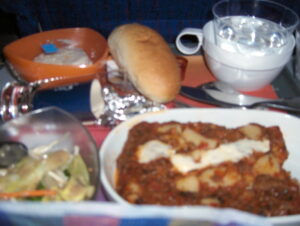
Dinner was served. Gunky pasta with meat sauce, salad, roll, a bit of orange-flecked cake. The couple to my right indulged in intimate whisper-talk. I interrupted long enough to say “Our New Year’s dinner, eh?” They laughed. Salt Lake City, they’re headed there, they said. Dinner over, I struggled down the aisle to pee.
No sleep before our Lima stop. Then on the ground, a flood of newbies filled the plane; bags banged against my shoulder, klump, kalump, kalump. Evicted from her comfy seats, the sleeping girl was yanked across the aisle by father’s hand. Too many people now, too little space. I sucked in air, hoarding breath, grasping for some calm. Think of something else, I told myself.
Lee-ma, Peru. Ly-ma bean. Lee-ma. Ly-ma. Nothing could be fine-a. Good grief, I thought, as I scanned Nordnorge’s smorgasbord in my memory bank. I saw salads, seafood, myriad desserts. But no beans, anywhere.
No wonder I’m getting cranky. I haven’t had a bean in weeks.
» posted on Thursday, December 31st, 2020 by Linda Lou Burton
Play it again, Sam
 Originally posted December 31, 2005 by Linda Lou Burton from Santiago, Chile – Time to move on; leave the comfort of our beautiful hotel; board the the 3 PM shuttle bus to the international airport. Maria was with us again! She had a family barbecue planned for the evening, she said, to bring in the New Year. But she was good-natured, as ever, her gentle melody-voice explaining the four stops we would have to make inside the terminal. One, check our bags and get our boarding pass. Two, go to Counter 54 and pay the exit fee of $18. Three, go through the security line. Four, turn in the declaration form. Check the bags? Oh no, I have to deal with BAGS again. Didn’t my tour information say “Baggage transfers included”? What did that mean?
Originally posted December 31, 2005 by Linda Lou Burton from Santiago, Chile – Time to move on; leave the comfort of our beautiful hotel; board the the 3 PM shuttle bus to the international airport. Maria was with us again! She had a family barbecue planned for the evening, she said, to bring in the New Year. But she was good-natured, as ever, her gentle melody-voice explaining the four stops we would have to make inside the terminal. One, check our bags and get our boarding pass. Two, go to Counter 54 and pay the exit fee of $18. Three, go through the security line. Four, turn in the declaration form. Check the bags? Oh no, I have to deal with BAGS again. Didn’t my tour information say “Baggage transfers included”? What did that mean?
The international airport was a good distance from the city, a pleasant freeway ride, with stands of pink-tasseled mimosa trees and glossy-leafed magnolias along the way. My Myrtle Beach seatmate and I agreed, it looked like South Carolina. Now, the terminal. Maria and our driver scurried to grab carts, piled the luggage on. Ah, that’s what it means, I thought. Maria helped me push my cart till I reached the line, got into the serpentine maze, then off she went to a special counter with Ross, who’d lost his passport. “Maybe he can just show them that Antarctic pebble he has,” I thought wickedly to myself. “Or the knife he says he won’t take out of his pocket no matter what security tells him.”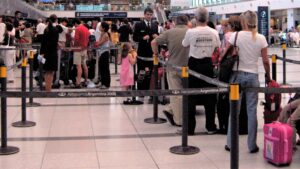
My wait began. I made seven serpentine turns before arriving at the check-in counter. But I was cool, full of Buenos Airesian hospitality, ready for anything. Others were not. “Stop fidgeting!” said a mother to her little boy. “Tuck your shirt in!” she said to another child. “Tie your shoes!” she said to a third. Their cart was piled high with enormous bags, the children were leaning, pushing, laying on the floor. “How much longer will it be?” said one of my South Carolina tour mates just behind. “I don’t know,” answered the other. That question, and that answer, repeated on a five-minute track, again and again and again. A Lan Chile employee, gorgeous, sleek and smiling, walked the line, threading plastic locks through every zipper on every piece of luggage. “We want your bags to be safe,” she explained to each of us. “We can’t lock our bags in the US,” I commented. “I know,” she answered, “but we don’t think it’s a good idea to have unlocked bags.” I thanked her profusely.
 Overhead, a fright. A Versace perfume ad postered a 40-foot woman in a state of swoon, eyes glazed, in a hands-on ceremony of multiple caressments by several other glazey-eyed swooners. Powerful stuff, Versace. More raunchy than Manuel’s penguins mating. Cover the children’s eyes! Cover mine! It made me chuckle.
Overhead, a fright. A Versace perfume ad postered a 40-foot woman in a state of swoon, eyes glazed, in a hands-on ceremony of multiple caressments by several other glazey-eyed swooners. Powerful stuff, Versace. More raunchy than Manuel’s penguins mating. Cover the children’s eyes! Cover mine! It made me chuckle.
Finally I’m up to bat, I swung my fancy-schmancy bags from cart to counter. In no time I had my seat assignment, my gate number, and a smiling wish for a “good trip.” Next to Counter 54, past the blue sign, Maria had said. I saw blue signs ahead, picked the wrong one, backtracked, handed over a US $20. Change back, it was $18 to leave Argentina. Security next. No problem there, except for lack of air. (Why do they call them AIR-ports? Most rooms are incredibly stuffy.) Oops, geez, what was the fourth stop? I couldn’t remember anything else. But there was a gate to stop me again. Hmmmm. Oh, the declaration form! I grabbed one from the counter, checked the boxes, in like flinn, it’s OK, I’m done!
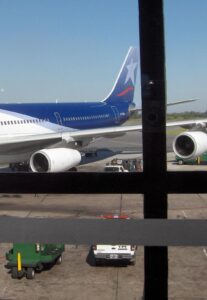 The waiting area by the gate was pleasant, not too crowded, I picked a seat where I could see the plane. Eek! A fright again. The Versace woman was there too, swooning above me, I moved. A tiny snack bar ahead. Aha, I remembered this time. Buy a bottle of water. I approached, asked. My God! Embarrassed. After two weeks I still don’t know the Spanish word for water. The clerk did not speak English. I pointed. She asked a question I did not understand. We leaned closer to one another, neither understanding. Finally she handed me a bottle, told me the price. I began laying money on the counter, but it was not enough. She was frowning at me. I should know how to trade by now. Still embarrassed, I vowed to better prepare for my next trip. An American sitting at the counter finally told me what to do. “Thanks,” I said to him, clutching my precious bottle of water. I slunk back to my seat, away from the scary Versace woman, away from the South Carolina travelers who were now in full-quarrel mode.
The waiting area by the gate was pleasant, not too crowded, I picked a seat where I could see the plane. Eek! A fright again. The Versace woman was there too, swooning above me, I moved. A tiny snack bar ahead. Aha, I remembered this time. Buy a bottle of water. I approached, asked. My God! Embarrassed. After two weeks I still don’t know the Spanish word for water. The clerk did not speak English. I pointed. She asked a question I did not understand. We leaned closer to one another, neither understanding. Finally she handed me a bottle, told me the price. I began laying money on the counter, but it was not enough. She was frowning at me. I should know how to trade by now. Still embarrassed, I vowed to better prepare for my next trip. An American sitting at the counter finally told me what to do. “Thanks,” I said to him, clutching my precious bottle of water. I slunk back to my seat, away from the scary Versace woman, away from the South Carolina travelers who were now in full-quarrel mode.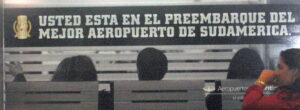
On board! And now I see, my boarding pass gave me an aisle seat, not the window I requested. But, ahhh, looky here. Must be a movie star, surely. A young man, handsome, slender, tight jeaned, day-old beard; he nodded, sat, whipped out his cell phone, made a call, low-voiced. “Do you want me to come and run naked on the beach with you?” he almost whispered to the phone. I was reminded of a song, “Hello young lovers, wherever you are”; if you don’t know it, look it up. Shades of Versace.
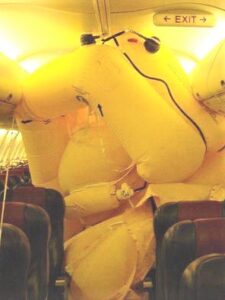 Buenos Aires to Santiago, that was the first leg of the flight. My Argentinian cowboy-movie star and I waited as others exited, a long, slow process; laughing at the image of what would happen in an emergency. “The disaster instructions show everyone quietly reaching under their seat for their life jacket,” he said. “Yes, and they don’t tell you NOT to pull the cord till they get to the end of the instructions!” I added. “I can see all of the life jackets going whoosh whoosh whoosh inflating before they remember.” We laughed harder. “And exiting the plane!” he said, “you know people would be fighting each other to get out first!” “Right,” I laughed, “pushing and shoving and stepping on each other.” We shook our heads at the thought of it, sniffle-laughing till it was time to go. He was headed for Mendoza.
Buenos Aires to Santiago, that was the first leg of the flight. My Argentinian cowboy-movie star and I waited as others exited, a long, slow process; laughing at the image of what would happen in an emergency. “The disaster instructions show everyone quietly reaching under their seat for their life jacket,” he said. “Yes, and they don’t tell you NOT to pull the cord till they get to the end of the instructions!” I added. “I can see all of the life jackets going whoosh whoosh whoosh inflating before they remember.” We laughed harder. “And exiting the plane!” he said, “you know people would be fighting each other to get out first!” “Right,” I laughed, “pushing and shoving and stepping on each other.” We shook our heads at the thought of it, sniffle-laughing till it was time to go. He was headed for Mendoza.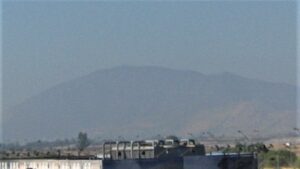
I exited the plane expecting to spend a few minutes in the waiting area while they spiffed things up for my reboard. But no! We were pinned like cattle in a hot and stuffy glass-walled passage. What was happening? Outside, I saw the familiar brown-hazed hills of Santiago. The crew exited the plane, pushed their way around us. “Why are we waiting here?” I asked one of the flight attendants. “I don’t know.” She shrugged her shoulders and kept walking. An American family waited in line in front of me, Mom and Dad, two teen sons, a daughter, maybe 12. She was cute in flippy short shirt and flip-flop sandals, fingers and toes glossed in Barbie pink. The boys were studying plane activity outside, theorizing our delay. The father  was scowling at the crew, as they walked away. The mother began to rattle questions in Spanish; one attendant turned around, answered. I decided to hang close, a language-bridge here, aha! The mother turned back to her family, explained there was a change of planes, we were to go to Gate 17. “For Lima?” I was quick to ask. “For LA?” “Yes,” she nodded, that’s where we’re going.” Well, I thought, at least I have a clue. I stood near the daughter, hoping I’d blend into the family circle. I could be the grandma! I asked her where they’d been, she named the cities, a Christmas holiday in Argentina. We talked about penguins, horses, sheep, the ranches, the barbecues. “I can’t eat lamb!” she said, “cute babies, oh no!” She showed me her fuzzy lamb souvenir.
was scowling at the crew, as they walked away. The mother began to rattle questions in Spanish; one attendant turned around, answered. I decided to hang close, a language-bridge here, aha! The mother turned back to her family, explained there was a change of planes, we were to go to Gate 17. “For Lima?” I was quick to ask. “For LA?” “Yes,” she nodded, that’s where we’re going.” Well, I thought, at least I have a clue. I stood near the daughter, hoping I’d blend into the family circle. I could be the grandma! I asked her where they’d been, she named the cities, a Christmas holiday in Argentina. We talked about penguins, horses, sheep, the ranches, the barbecues. “I can’t eat lamb!” she said, “cute babies, oh no!” She showed me her fuzzy lamb souvenir.
Finally the line began to move, around a corner, we turned, we’re in an x-ray room! Security, again. What the &%$#*(&)(*&? How many of us have had a chance to purchase bombs and guns since the security check that put us ON the plane? I’ve never been x-rayed getting OFF a plane. But, there it was. Then, worse. My pack was stopped, pushed to the side, I’m signaled over. “Senora, I need you to open your pack,” the attendant said.  I smiled, complied, unzipped the top. She pointed to an object, queried, “What is that?” I reached for my laser-thermometer, quickly picked it up. She jumped back a step; I slowed my movements down. “It’s my thermometer,” I said clearly. “Would you like me to show you how it works?” I realized she could see its push-button — could it be a detonator? I didn’t dare to laugh. She studied the object in my hand, I forged ahead and pushed the button. “78” registered on the face panel. “See,” I said, “it shows the temperature in this room.” She nodded, smiled at me. “That’s fine,” she said, “that’s all I need to see.” I was dismissed.
I smiled, complied, unzipped the top. She pointed to an object, queried, “What is that?” I reached for my laser-thermometer, quickly picked it up. She jumped back a step; I slowed my movements down. “It’s my thermometer,” I said clearly. “Would you like me to show you how it works?” I realized she could see its push-button — could it be a detonator? I didn’t dare to laugh. She studied the object in my hand, I forged ahead and pushed the button. “78” registered on the face panel. “See,” I said, “it shows the temperature in this room.” She nodded, smiled at me. “That’s fine,” she said, “that’s all I need to see.” I was dismissed.
I hurried out the door, but my language-bridge family was nowhere in sight. A marker overhead said Gate 13. I ran, chest tightening with every step, towards Gate 17. I had no idea when my plane was due to leave. I could not bear to miss another flight. Puff puff pant pant Gate 17. There, a flight prepared to leave for Canada. My heart sank. And then, I gained my senses back. “You don’t need no stinking translator,” I thought to myself. “Just read the Departure Board.”
“Lima,” it said. “Gate 21. 7:30. On time.” Well rats and hallelujah. I had been fretting and rushing for nothing. I had plenty of time. I ambled down the walkway, thinking about the cup of coffee I’d buy at the Dunkin Donuts spot I remembered from my pass-through two weeks earlier. Ah, just ahead I saw my adopted granddaughter in the flippy skirt, waving at me. I might have a donut too, I thought as I reached for my change purse. After all, it was New Year’s Eve. A quick left to the donut counter. It was closed.
No coffee. No donut to dunk. But I had my bottle of water. And I had my gate. And I had time to spare. My Barbie friend came over to chat, while we waited for airport things to happen, in their own good time.
» posted on Tuesday, December 22nd, 2020 by Linda Lou Burton
Sound the Trumpets! Mission Accomplished
Christmas in Antarctica originally posted by Linda Lou Burton December 22, 2005 from Cape Horn, Chile – I’d had my fingers crossed since June 22 and the trip to Barrow, Alaska, where I was NORTH of the Arctic Circle on the first day of Summer. There didn’t seem to be any way possible to get myself SOUTH of the Antarctic Circle on the first day of the southern hemisphere’s Summer, because nobody GOES there. But Cape Horn would do. The southernmost point of what is considered South America, Latitude 55.43 degrees south. Barrow was at Latitude 71.19 degrees north and even Fairbanks, Alaska was 64.83 degrees. But hey, the earth is made up of mostly LAND at the north end and mostly WATER at the south. So be it. Cape Horn would satisfy me. I wanted to set my foot on that chunk of land on December 22.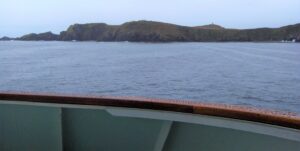
We had come through the Beagle Channel to arrive at the Horn at 2:30 PM, and our leader announced with great glee, “We can land!” In the last fifteen crossings, he told us, the weather had been fit for a landing only three times. He was jumping around, PREPARING things. I did my analysis too. The sea didn’t look too rough, the rain wasn’t coming down too hard, the distance to shore wasn’t too far. But then.
I zoomed in on the steps. The shoreline was rocky, the landing beach quite small. A sheer rock cliff rose straight up from the beach, and that’s where the steps were, fastened somehow to the rock wall. One hundred and twelve rickety wooden steps, some broken or split, all slippery in the waves and rain.
Just at the top on a rounded grassy knoll I could see the monument to the albatross, honoring all the sailors who perished while trying to round the cape. Sara Vial’s poem was inscribed at the bottom of the monument, I read from our handout:
“I am the albatross that waits for you at the end of the earth. I am the forgotten soul of the dead sailors who crossed Cape Horn from all the seas of the world. But they did not die in the furious waves. Today they fly in my wings to eternity in the last trough of the Antarctic winds.”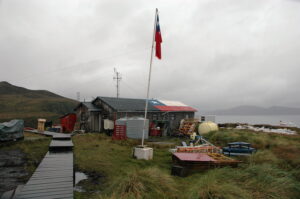
A few hundred yards left of the monument was the the home of the lighthouse keeper, supposedly occupied by the keeper, his wife, a cat, and a dog. A lonely existence! “There may be souvenirs available from there,” we were told, “but be patient, the house is very tiny.”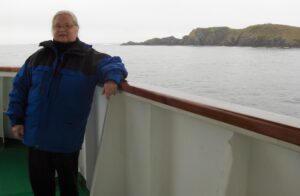
Reluctantly, I decided not to make the trip. I’d consider my Mission Accomplished by my presence on the ship. I spent the day in the Torghatten Salong, with my cameras and 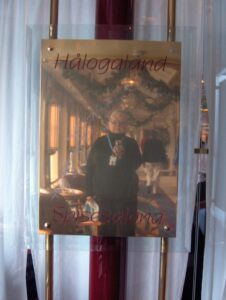 with many others who didn’t want to venture up those steps. I walked in the open air of Deck 5. “Will you take my picture with the Cape behind me?” I asked one of the stay-behinds. She did.
with many others who didn’t want to venture up those steps. I walked in the open air of Deck 5. “Will you take my picture with the Cape behind me?” I asked one of the stay-behinds. She did.
That evening, at dinner, those who braved the climb relayed their story. “I have a certificate!” they said. “I have walked on Cape Horn!”
Well, I’ve been close. “Cape Horn is one of the greatest graveyards for ships anywhere in the world,” were the words on my handout. “It is a rite of passage for sailors the world over.” “Aha! My rite of passage,” I thought. “I have rounded the Horn.”
Overall, I’m pretty pleased. First Day of Summer, I declare you a success.
» posted on Friday, December 18th, 2020 by Linda Lou Burton
I Take You to the Ship!
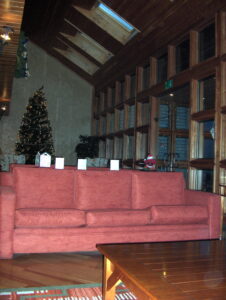 Christmas in Antarctica originally posted by Linda Lou Burton December 18, 2005 from Puerto Chacabuco, Chile – I found myself in the Loberias del Sur, address Carrera No 50, Puerto Chacabuco, Chile. Patagonia. The hotel perched high on a hill at the head of a narrow fjord, and every mountain around had ringlets of snow. http://www.loberiasdelsur.cl
Christmas in Antarctica originally posted by Linda Lou Burton December 18, 2005 from Puerto Chacabuco, Chile – I found myself in the Loberias del Sur, address Carrera No 50, Puerto Chacabuco, Chile. Patagonia. The hotel perched high on a hill at the head of a narrow fjord, and every mountain around had ringlets of snow. http://www.loberiasdelsur.cl
When Marco drove away, attention turned to me. “The dining room is here, Ms Linda, the sauna and gym are there,” he pointed. I looked around the lobby, wood expanded with windows opening the view to water, hills, and trees. At one end a Christmas tree reached twenty feet into the air; at the other, a fire flickered under a mantel decorated with green. “Let me show you to your room.” Fancy-schmancy and the carry-on were wheeled away, just down the hall, 114. What luxury! I wanted a bath. A nice, long, hot, steaming, bath. I dug into the luggage for clean clothes, hairbrush, toothbrush, my makeup. What luxury!
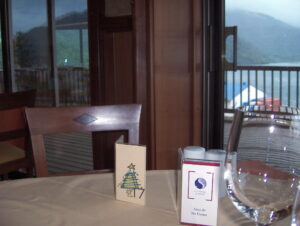 After the bath, the next need was food. The dining room was not far away, just across the stone-paved lobby, past the Christmas tree. A windowed wall at the edge of the hill, just above the pier where, tomorrow, my ship would magically appear. “8:30 AM,” I was promised. “It will be here.” I ordered salmon, grilled. Potatoes, in crème. Tomato salad. A glass of red wine. Food began to appear, appetizers, cheese, rolls dripping with butter, garlic, forks and plates, the table filled. I almost ate it all.
After the bath, the next need was food. The dining room was not far away, just across the stone-paved lobby, past the Christmas tree. A windowed wall at the edge of the hill, just above the pier where, tomorrow, my ship would magically appear. “8:30 AM,” I was promised. “It will be here.” I ordered salmon, grilled. Potatoes, in crème. Tomato salad. A glass of red wine. Food began to appear, appetizers, cheese, rolls dripping with butter, garlic, forks and plates, the table filled. I almost ate it all.
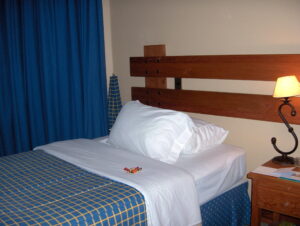 Only one need remained. Sleep. Back into my room, the bed turned nicely back, the pillow with two candies, the curtains drawn. My watch said 5 PM. It had been 35 hours since I got out of bed in Los Angeles. Time to change, I thought, and move into the Chilean realm. 10 PM, Patagonia. I set my watch.
Only one need remained. Sleep. Back into my room, the bed turned nicely back, the pillow with two candies, the curtains drawn. My watch said 5 PM. It had been 35 hours since I got out of bed in Los Angeles. Time to change, I thought, and move into the Chilean realm. 10 PM, Patagonia. I set my watch.
The telephone! “Ms Linda, your taxi is here!” My head was foggy with sleep. “I did not order a taxi,” I replied. “No! It is here. Please come!” I shook my head and tried to focus my eyes on the clock, but it made no sense. “Where do I need to go in a taxi?” I asked, puzzled. “To the ship! To the ship!” “I thought the ship would be here,” I mumbled, “just at the pier below.” “Yes, it is here. Now, hurry so you can go to the Park!” “I do not want to go to the Park!” I said, “I want to go to the ship. What time is it?” “8 AM! Please hurry!” “Let me come to the desk,” I said, not understanding anything at all.
Yes, it was 8 AM. I had slept for 10 hours, unmoving in the bed. I threw on yesterday’s clothes and hurried to the lobby. A man was standing at the desk, pacing foot to foot, in a hurry. I nodded to him and said “Who asked you to come?” “The tour company sent me,” he said, “to take you to the ship.” Yes, outside, just below the hill, I could see the red and black of the Nordnorge. “But I can walk,” I said. “And I did not expect it to arrive until 8:30.” “No! I will take you there,” he insisted. “Then give me an hour,” I said. “I’ll have to gather everything, I need to dress.” I didn’t have the starch to hurry any more.
“One ow-her,” he said. “I will wait one ow-her.”
Now I’m ready, fancy-schmancy zipped, teeth brushed, jacket on. The lobby bustled with my goodbyes. “Thank you for staying with us! Have a good trip! Please to come back!” I got into the taxi. He headed east, past a row of matching houses, corner turned, going away from the ship. “Where are you taking me?” I asked. “I want to go to the SHIP!”
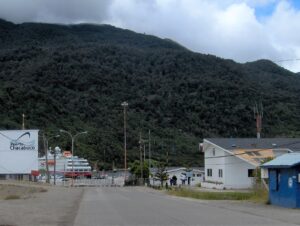 “Is this way,” he answered, making more turns through the tiny village. Then we started down the hill, past trucks, loaded with cargo, to the security gate. He mumbled answers, flashed a sign. “Nordnorge,” is what it said. They waved us through.
“Is this way,” he answered, making more turns through the tiny village. Then we started down the hill, past trucks, loaded with cargo, to the security gate. He mumbled answers, flashed a sign. “Nordnorge,” is what it said. They waved us through.
Around the buildings, workers busy with the morning chores, people boarding buses, headed for the Park. Ah! I remembered. The first shore excursion from the ship was to Aiken Park from Puerto Chacabuco. I saw those sights yesterday, and more! The gangplank. A tall Norwegian in uniform stood by, helping passengers find their buses. He spotted the taxi, waved, came to take my bags.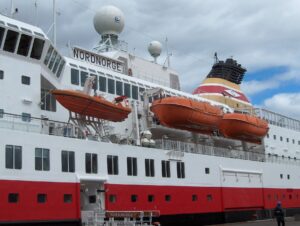
“Welcome aboard!” he smiled at me. “I am Morten, the ship’s Purser. We have been expecting you.” Up the gangplank, fancy-schmancy now lifted ahead of me, stop, let me make your card.
Morten lifted the digi-cam and snapped my photo. In a moment my check-in was complete. I donned the necklace that would be mine for the next two weeks; picture ID, passport number, date of birth, country of origin; plastic on-a-cord, serving as both room key and charge card, bar-coded for scanning every need.
» posted on Thursday, December 17th, 2020 by Linda Lou Burton
The Day I Crossed the Andes in a Taxi
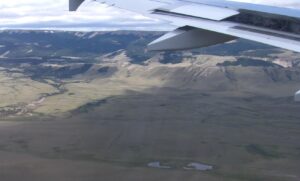 Christmas in Antarctica originally posted by Linda Lou Burton December 17, 2005 from Balmaceda & Puerto Chacabuco, Chile – I’d decided to keep my watch on Seattle time until I reached the ship. The plane landed in Balmaceda at 11:30 AM, coming in over green fields, little lakes, farmhouses, sheep. It was rural and sparse and, I soon discovered, windy. I asked the flight attendant to help me get my carryon bag down the steps but even on the ground I was caught sharply by the gusts.
Christmas in Antarctica originally posted by Linda Lou Burton December 17, 2005 from Balmaceda & Puerto Chacabuco, Chile – I’d decided to keep my watch on Seattle time until I reached the ship. The plane landed in Balmaceda at 11:30 AM, coming in over green fields, little lakes, farmhouses, sheep. It was rural and sparse and, I soon discovered, windy. I asked the flight attendant to help me get my carryon bag down the steps but even on the ground I was caught sharply by the gusts. 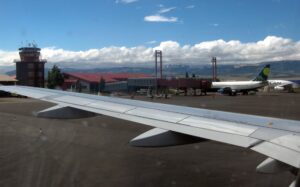
There was nothing near the airport, no town, no store, not even any houses. The baggage carousel was easy to spot in this tiny terminal, and I saw my fancy-schmancy circling as soon as I arrived. What I did not see was a uniformed Norwegian Cruise Lines official standing with a Voyage of Discovery sign. I wandered out into the main hallway, looking hopefully for something that would indicate a connection. “Taxi” I was offered, by several smiling hopefuls. I shook my head no and went to stack my luggage. Perhaps after a drink of water I could think what to do.
Then I heard my name.
I waved my hand and saw a young man, holding a slip of paper from which he was phonetically calling out the words he saw in print. “Leen-da?” “Yes! I’m Linda!” I yelled across at him and he immediately rushed to take my bags. He began pulling them towards the door until I put out my hand and ordered “Stop! Restroom!” He shook his head, puzzled. “No Eenglish,” he told me. “No Spanish!” I replied. I tried to think of a gesture that would indicate my need for a restroom stop. A woman on a nearby bench began to laugh as I continued “Restroom?” and he continued “No Eenglish.” She said something to him I did not understand and then he said to me “Bathroom?” I nodded, and he pointed around the corner. I left my bags on faith and went to pee.
When I returned my bags were gone. But there he stood, waiting to escort me out the door. I desperately needed a drink of water, but couldn’t bear to go through another round of misunderstandings. And where were my bags? He led me to a taxi at the curb, and opened the door. “What is your name?” I asked, extending my hand in handshake mode, “and where are we going?” Amazingly he seemed to understand, and offered his hand in return. “I am Marco,” he said.
We then began a game of Charades. “Where?” I pointed towards the road. “Ship!” he answered. “How far?” I asked, extending my hands apart. He shook his head. “How long?” I asked, tapping on my watch. “Two ow-hers,” he said, adding a distance in kilometers, which had no meaning to me.
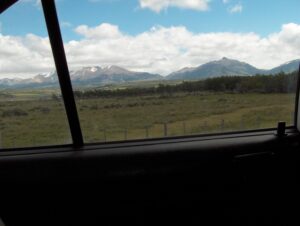 I was still curious about my bags and pointed to the trunk. “Can I have my black bag up front?” I asked. I don’t know if he understood, but he opened the trunk. My three bags were safely stowed, and I reached for the carryon, which he quickly retrieved and put into the back seat for me. I was beginning to feel a little more comfortable now, and after 30 hours with almost no sleep, welcomed any offered help. I settled in for the ride.
I was still curious about my bags and pointed to the trunk. “Can I have my black bag up front?” I asked. I don’t know if he understood, but he opened the trunk. My three bags were safely stowed, and I reached for the carryon, which he quickly retrieved and put into the back seat for me. I was beginning to feel a little more comfortable now, and after 30 hours with almost no sleep, welcomed any offered help. I settled in for the ride.
Marco had only driven two or three miles when he pulled the car to the side of the road and stopped. The highway was a smoothly paved two-lane, but there was no other traffic. “I wonder if anyone will ever find my body,” I thought, more resigned than worried. “I hope my brother remembers all the insurance policies and everything gets distributed correctly.”
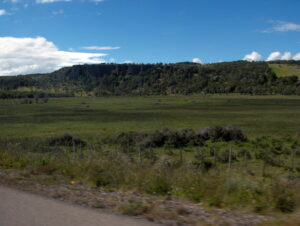 Marco turned to face me in the car, his face wrinkled in deep concentration. Then he gestured to the landscape and said “Big fire!” I looked around to see remains of tree trunks scattered on the hillsides, a sight of devastation like I had seen before. “Oh!” I nodded. “How long ago?” He looked worried at the question, and narrowed his eyes, thinking. Finally he answered “One hundred years!” I was excited at our progress, so asked another question. “What kind of trees? Trees? What kind?” More thinking, and then he smiled and shouted “El Pino!” “Pine trees!” I shouted back, laughing. We smiled at each other, satisfied. We’d had a conversation.
Marco turned to face me in the car, his face wrinkled in deep concentration. Then he gestured to the landscape and said “Big fire!” I looked around to see remains of tree trunks scattered on the hillsides, a sight of devastation like I had seen before. “Oh!” I nodded. “How long ago?” He looked worried at the question, and narrowed his eyes, thinking. Finally he answered “One hundred years!” I was excited at our progress, so asked another question. “What kind of trees? Trees? What kind?” More thinking, and then he smiled and shouted “El Pino!” “Pine trees!” I shouted back, laughing. We smiled at each other, satisfied. We’d had a conversation.
I took my camera from my pack and began snapping pictures of the countryside as we rode along. This seemed to please Marco, perhaps because I was interested in the place that was his home. He crossed the highway at a gravel turnout and opened the door for me. He grinned as he gestured towards a waterfall, splashing into a rushing stream. “Big fish,” he said. I snapped more pictures.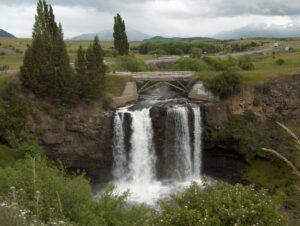
The landscape looked much like the wide open spaces of Wyoming to me, or eastern Washington state, and something very familiar was blooming everywhere. 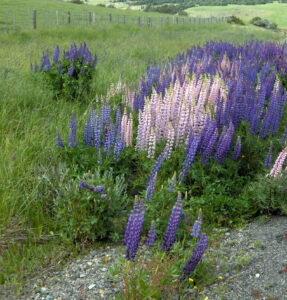 Lupine! Pinks and blues and purples and a soft cream color I’d never seen before. I tapped Marco on the shoulder and waved my camera as we passed a particularly beautiful field . “Flowers!” I said. He found a stopping place and let me out again. “So beautiful!” I said, “thank you.” Marco smiled.
Lupine! Pinks and blues and purples and a soft cream color I’d never seen before. I tapped Marco on the shoulder and waved my camera as we passed a particularly beautiful field . “Flowers!” I said. He found a stopping place and let me out again. “So beautiful!” I said, “thank you.” Marco smiled.
In about an hour we came to a town, identified by sign as Coihaique. This place I had read about in the tour materials. Maybe we were getting close? Marco drove through the downtown area, pointing out stores, circling the park where families were picnicking, children swinging. He stopped at a monument and pointed to the figures.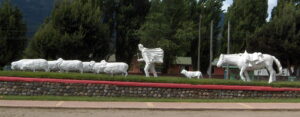
Was his English getting better? Or was my ear finally getting the Spanish? I’m not sure, but I seemed to absorb what was going on around me. At the gas station, I commented on his car. “Toyota!” I said. “I have a Toyota too.” “Good car,” Marco said.
We changed highways in Coihaique, and the landscape became steeper and more rugged, the road more challenging. Marco stopped at a lookout point high on the hill so that I could see the town laid out in the valley below. It reminded me of a place I once stood in Yosemite National Park. Now here I was, in the midst of the Andes.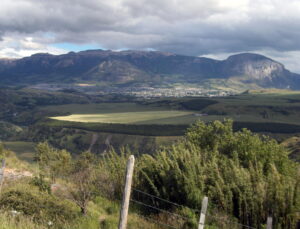
A few miles more down the road, Marco stopped to show me a rock outcropping that extended for several miles, high above the valley. “Great Wall,” he said. “Oh,” I finally understood, “the Great Wall, like China.” He nodded. Language is a great wall, I thought to myself. I wished that I could ask Marco about his family, his work, the places he had been. But I did not know how.
The road wound down now, and suddenly around a curve there was a road block. Marco pulled his taxi to the side of the road as the uniformed officer approached. Had we been speeding? I was not sure. Marco began to pull out papers and answer questions. All I could see was the elbow-length white leather gloves on the officer’s hands. Then he waved us on. “Normal?” I asked. “Sometimes,” Marco replied.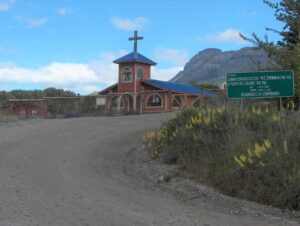
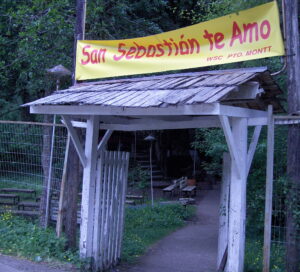 There was a river to our left. The river valley flattened and widened and campsites began to appear. I spotted obvious places for fishing and rafting. It reminded me of the Ocoee River in eastern Tennessee. “Simon River,” Marco indicated to me. “Big river.” We stopped at two more waterfalls, and two roadside altars. “San Sebastian,” Marco said, “saint of travelers.” I snapped more pictures.
There was a river to our left. The river valley flattened and widened and campsites began to appear. I spotted obvious places for fishing and rafting. It reminded me of the Ocoee River in eastern Tennessee. “Simon River,” Marco indicated to me. “Big river.” We stopped at two more waterfalls, and two roadside altars. “San Sebastian,” Marco said, “saint of travelers.” I snapped more pictures.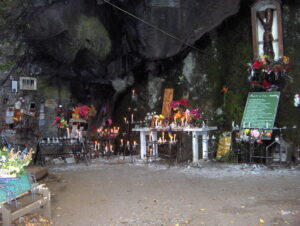
Another hour had passed, and we were approaching another town. Puerto Aisen, I saw on a sign. A large bridge loomed ahead. “Simon?” I asked, as we crossed over. “Aisen,” Marco said back. I spotted a fortified building on the left. “Jail?” I said, hoping he’d reply with the Spanish word. “Bad pipples,” he laughed.
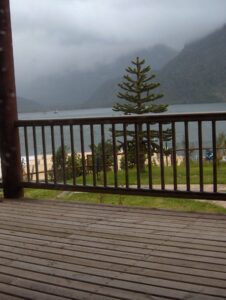 Now there was a large body of water on the right. “River?” I asked. “Ocean,” he said. Ocean! Was I almost to my ship? The answer was yes. In ten minutes more we drove into a small village surrounded by ice-capped mountains. Puerto Chacabuco, at last. Marco stopped the taxi in front of a beautiful building, wood and glass overlooking a narrow channel of water. There was no neon marquee, but I was sure I’d reached a destination of sorts. A handsome young man in a black uniform with golden epaulets met us at the door.
Now there was a large body of water on the right. “River?” I asked. “Ocean,” he said. Ocean! Was I almost to my ship? The answer was yes. In ten minutes more we drove into a small village surrounded by ice-capped mountains. Puerto Chacabuco, at last. Marco stopped the taxi in front of a beautiful building, wood and glass overlooking a narrow channel of water. There was no neon marquee, but I was sure I’d reached a destination of sorts. A handsome young man in a black uniform with golden epaulets met us at the door.
“Welcome Ms Linda! We have been expecting you! Your room is ready!” he said, in English. I turned to Marco. “Thank you so much, that was such a beautiful ride,” I said. Then I said to my host, “Has he been paid?” “Oh yes, the tour company has taken care of that,” my host replied. “He is free to go now.”
“Then please tell him how much I appreciate everything he did for me, please let him know it was very good, and please help me to give him a very good tip.” I pulled out all of the Chilean pesos I had and laid them on the counter. The host removed some bills and spoke to Marco in Spanish. Marco nodded as took the money. Then he shook my hand, smiled, and drove away.
Read More
Balmaceda, Chile – https://www.rutadelosparques.org/en/balmaceda/
Coyhaique, Chile – https://www.rutadelosparques.org/en/coyhaique/
Puerto Aisen, Chile – https://www.rutadelosparques.org/en/puerto-aysen/
Puerto Chacabuco, Chile – https://www.rutadelosparques.org/en/puerto-chacabuco/
» posted on Thursday, December 17th, 2020 by Linda Lou Burton
Jack Daniels and the Dunkin Donuts
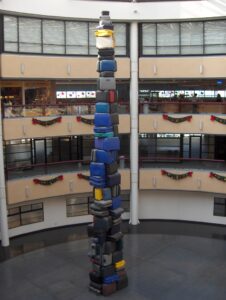 Christmas in Antarctica originally posted by Linda Lou Burton December 17, 2005 from Santiago & Puerto Montt, Chile –It took one hour and 25 minutes to get to the glassed-in box that housed Policio, Immigracion. I had my passport in my hand, a friendly I’m-not-dangerous expression on my face. “Have you been here before?” I was asked, as she flipped through my passport pages, which were as yet free of any mark. “No, my first time,” I replied.
Christmas in Antarctica originally posted by Linda Lou Burton December 17, 2005 from Santiago & Puerto Montt, Chile –It took one hour and 25 minutes to get to the glassed-in box that housed Policio, Immigracion. I had my passport in my hand, a friendly I’m-not-dangerous expression on my face. “Have you been here before?” I was asked, as she flipped through my passport pages, which were as yet free of any mark. “No, my first time,” I replied.
“Go pay. One hundred dollar.” I knew they would collect a hundred US dollars as I entered, I had three crisp fifty-dollar bills folded and ready in my passport case, one for good measure. But there was no sign anywhere indicating that it would be anywhere else but at the gate. “Where?” I asked, more than a little frustrated. She pointed to an area behind me, where there had been no line. I had observed none of the other passengers standing there during the long wait.
I trudged back across the nearly empty room, where three ladies merrily chatted away. “Pay here?” I asked. She had me slide my passport through the slot and then said “One hundred dollar.” I passed the money through. She stamped the passport, printed a receipt, and stapled it inside.
I trudged back to my original waiting line, ready to get aggressive about position. I edged my wheelie carry-on to the yellow line, like a runner at the starting gate. Go! I’m certain now I’m good. Passport to the glassed-in booth, receipt poking out the side. She flipped through again, glared at me. “You did not fill out the papers! Go back!” I had not noticed two small papers stuck inside, that asked for name and address and purpose of visit. “Can I please sit down to fill this out?” I asked, noticing a bench just a few feet past her. My knees were begging me to SIT. “NO! GO!”
I moved behind the yellow line again, first in place, determined not to let anyone ahead, hastily scribbling in the pre-measured boxes demanding name/address/married/single/widowed/divorced. ????? I thought. @#%$^&&#$^ I also thought. Now I’m up again! Go! Passport into the glassed-in booth, papers complete, fee paid. She slapped the stamp against the page and thrust it back to me. “Welcome to Chile,” she said.
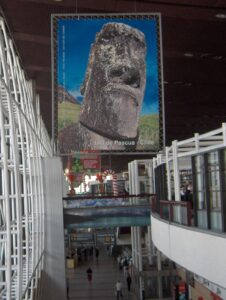 I saw a sign pointed to the baggage area, which wound through the duty-free shop. Now I’m in the main terminal, crowded with people pushing, shoving, hauling carts piled high with boxes, bags, children. I find a sign for Flt 601, and there below, tossed already onto the floor, are fancy and schmancy, waiting for me. No other luggage is in sight, long gone, to somewhere.
I saw a sign pointed to the baggage area, which wound through the duty-free shop. Now I’m in the main terminal, crowded with people pushing, shoving, hauling carts piled high with boxes, bags, children. I find a sign for Flt 601, and there below, tossed already onto the floor, are fancy and schmancy, waiting for me. No other luggage is in sight, long gone, to somewhere.
Good fortune! The carts are free, parked here and there. I grabbed a cart and piled my belongings together, all my stuff, at last! I headed for the gate. Or so I thought. There was a line of carts poised to go through, oh no I can’t believe it, CUSTOMS. I get in line again, leaning wearily against my cart. Fifteen minutes, edging forward, finally to the x-ray machines, a gentlemen is standing there, collecting papers. PAPERS? What papers? I ask. I did not see any papers! He handed me a sheet, “Here Senora, to declare,” he kindly stated. Many questions, name, address, widowed/divorced/married/single, did I bring plants or animals into the country? No. I handed him the completed form, and he stuffed it into a stack on the counter, never glancing at it.
“Go now,” he said, nodding at me. My bags disappeared into the x-ray machine, but I held possessively onto my cart.
On the other side, a sign in blue-and-white loomed overhead. Spanish, of course, but I could make it out. SMOKING CAUSES CANCER was the basic message. It pictured a person looking very ill. I pushed my now x-rayed baggage forward, past the waiting taxi drivers, onto the elevator, up to the Departures tier. Everything smelled of cigarettes.
And what did I see? LINES. Nacional. Puerto Montt, Balmeceda. I did not know what fate called next, but, I could not stand in line. I had to sit. I had to rehydrate. The vending machines asked for coins I did not have, could not read. I spotted stores, just around the corner. A bar! “Ginger ale?” I asked. “Si,” replied the bartender. “Ice?” I ventured, hopefully. “Ice,” he replied. I sat down. It was 3 AM by my watch, but 8 AM in Santiago. A mustached blond man at the next table ordered coffee, lit a cigarette.
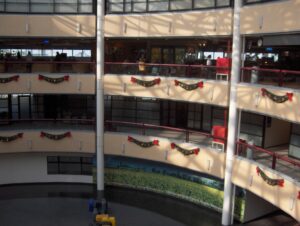 I sipped my ginger ale, watched the people passing by. On the wall, a sign advertised Jack Daniels Tennessee Whiskey. Hm! I recalled my tour of the place, my lunch at Bobo’s, in a tiny town in the Tennessee hills. The next store was a music store, plastered with posters of Jennifer Lopez. Just past that, Dunkin Donuts was the spot for a Chilean breakfast.
I sipped my ginger ale, watched the people passing by. On the wall, a sign advertised Jack Daniels Tennessee Whiskey. Hm! I recalled my tour of the place, my lunch at Bobo’s, in a tiny town in the Tennessee hills. The next store was a music store, plastered with posters of Jennifer Lopez. Just past that, Dunkin Donuts was the spot for a Chilean breakfast.
“No matter how far we go, we’re never very far away,” I thought.
Fortified now. Back to the lines. I handed the ticket agent my passport, she asked my destination. “I do not know,” I replied, ‘but my name should be in your computer somewhere.” I explained about the tour company, the delay, the arrangements. She called for a supervisor. They talked for a while, in Spanish of course. I waited.
Then she began to type. “You will come back later to see your gate,” she said, “it is too early now to know.” “Then you see my name?” I asked. “Si.” “Where am I going?” I asked again. “Balmeceda,” was the answer, “at 12:55.” She pasted new tags on my luggage, threw it onto a belt. Suddenly, I had a boarding pass in my hand.
I pushed my cart outside into the Santiago air. It was sunny with smog, and pleasantly warm. “Santiago,” I thought, “is the same latitude as Birmingham, Alabama. So, this would be like a Birmingham day in June.” More or less. I snapped a few pictures of the rounded brown hills and went back inside.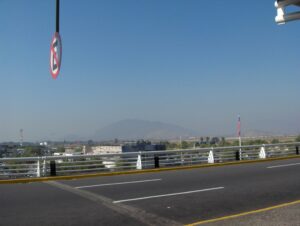
Now to stay awake until noon. My head was drooping. I decided to eat. Back to the café, a milkshake now, a fruit tart. How to pay? How to tip? I blundered through.
Security at Santiago was easy. Finding my gate was easy. Or, is everything routine now? Seated, with two hours to wait, I fell asleep. But still, I heard the call. Onto the plane and a window seat! A couple to my right. She was so friendly, now I know I cannot sleep. She asks where I am going, listens to my tale. “We are going to Puerto Montt,” she said. “That is my home. We were delayed in Miami ourselves, our luggage lost. We’ve been filling out papers.” Now I knew, we were kin! “What were you doing in Miami?” I asked. “Oh, we live in North Carolina,” she replied. “My husband is from Alabama.” He smiles and nods at me. Maybe our paths have crossed before, in a grocery store, at a football game? Small world thoughts again.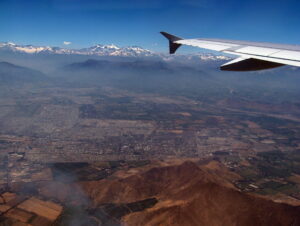
The sky was clear as we left the ground, and suddenly I saw the city of Santiago below. My seatmate leaned to look with me, described the city. She knew the route, pointed out the mountains, the lakes. Osorno Volcano I recognized from the pictures I’d seen. She verified I was correct.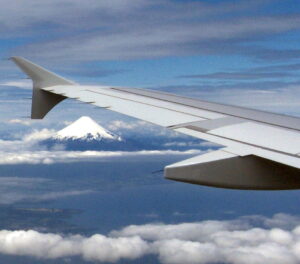
The plane glided over lakes, water, resorts, boats, houses, trees. We were on the ground and my friendly companions departed. “Have a wonderful Christmas with your sister,” I said.
“Good luck in Balmaceda,” they said to me. “We hope you catch your ship.”
» posted on Thursday, December 17th, 2020 by Linda Lou Burton
Fatal Mistake
Christmas in Antarctica originally posted by Linda Lou Burton December 17, 2005 from Santiago, Chile – The tiny screen in front of me was my lifeline. Set on GPS, it showed my location as if I were looking from the cockpit, with the jagged peaks of the Andes on my left. Other screens were map-like, with city-dots identifying the political name for what was there, our tiny-toy plane an imaginary figure above the world, creeping south. Occasionally the screen flipped to a statistics page. Velocidad. Altura. An English menu was offered but it took so long to download I decided to stick with the Spanish version. I determined we were flying at 35,000 feet with a ground speed of 508 mph.
I jotted down map-names. Trujillo. Rio Branco. Cuzco. Arequipa. Arica. Huancayo. Juliaca. La Paz. Iquique. Antofagasta. Galapagos Islands. Machu Picchu. Ascencion. Vina del Mar. Oruro. Totori. Calama. Salta. Pachacamac. Trinidad. Sucre. Copiapo. Mumahuaca. Concepcion. Cordoba. Santiago. Maldonado. Balmeceda.
I believe Balmaceda was a name Par said to me as a possible destination after Santiago. But he was not sure. I must wait and see.
They served food again after our stop in Lima. An omelet, tasty and hot, some fruit. A cinnamon cake. “You can have my melon,” Sofia said. “If I can have your grapes.” It was a perfect swap. The man on my left was sleeping. But Sofia and I talked. She was born in New York, to Argentine parents. Her father worked for Citibank so was transferred twelve times as she grew up. Elementary school in the Philippines, high school in Greece. “I followed my ex-boyfriend to LA,” she told me, “and now I do not want to leave. But I have so many choices.” “Where is your ex-boyfriend?” I asked. “He’s moved on,” was the reply.
I could not sleep. My brain was still on Seattle time. It was 10 PM when we left Lima, with three more hours to fly. Midnight, and my Friday became my Saturday, but outside it was already light.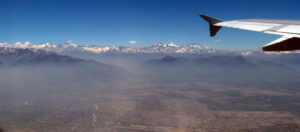
I finally made it to Santiago, 48 hours behind schedule. I waited till the plane was nearly empty before I started down the aisle. It was 2 AM on my watch, 7 AM on the ground. Next step, get in line at Customs. Fatal mistake, waiting so long to leave the plane. There were at least 300 people ahead of me. I wished I’d slept. I wished I had water. I wished for a chair.
My next invention, a fancy-schmancy travel bag on wheels with a pop-down seat.
» posted on Monday, December 14th, 2020 by Linda Lou Burton
United, We Stand
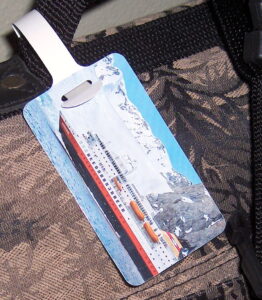 Christmas in Antarctica originally posted by Linda Lou Burton December 14, 2005 from Los Angeles, California, United States – The shuttle was right on time. 3:15 AM, just as promised. The van was already filled with middle-of-the-nighters getting ready to travel places, see things, do stuff. A couple headed for New Zealand thought THEY had the market on distance. Ha! I’m going to Antarctica. That was the trump card, for sure.
Christmas in Antarctica originally posted by Linda Lou Burton December 14, 2005 from Los Angeles, California, United States – The shuttle was right on time. 3:15 AM, just as promised. The van was already filled with middle-of-the-nighters getting ready to travel places, see things, do stuff. A couple headed for New Zealand thought THEY had the market on distance. Ha! I’m going to Antarctica. That was the trump card, for sure.
An icy fog swirled around us as we hurtled through the dark, headed for SeaTac airport, AKA, Flying Carpet Central. “What do you do in case of bad weather,” I asked, fearful we might not make the plane on time. “Oh, I have studded tires,” was the reply. “I always get you there.”
Inside. In line. Bags checked to Santiago, Chile. Boarding pass. Rode the shuttle to another terminal. Got coffee. Got muffin. Got newspaper. Waited.
5:40 AM. Got on the plane!! Stowed carryon. Found seat. Buckled up. Waited.
6:00 AM. “We’re going to put a little deicer on the wings,” said the pilot. “Don’t be alarmed by the smell.” Mysterious vehicle with shiny spotlight dumped something all over the wings. Waited.
6:15 AM. Taxied to runway. Waited.
6:30 AM. Screechy clunky noise from wing. More noise. More noise. Pilot announced “We are computer driven and the computer is acting up. We’re trying to get it fixed.”
7:00 AM. Sorry can’t fix, have to go back to terminal. We’ll know something by 8 AM. Ride back to terminal. Wait.
8:00 AM. Sorry folks, they can’t seem to fix it. Get off the plane and go have breakfast on us. Voucher worth $5.50. Come back at 9:00.
Got in line to contact LAN Chile Airlines. Please United, see if I can make another connection. Answer. NO. Wait and see.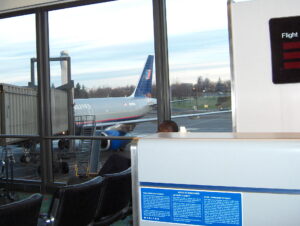
9:00 AM We have a good plane. Please reboard. By now the passenger load was much lightened. Lots of people were headed for Hawaii. Lots of people missed connections. Mucho groucho. THIS IS CRAP was the most frequently heard comment in the rebooking line. Hey, when you’re headed for relaxation, you don’t want anything to slow you down. Right?
Pretty little Charlie, a two-year-old blond sweetie traveling with her mother and grandmother, did not reboard. I did.
Back in my window seat. Young man has returned to seat beside me. He’s dressed in T-shirt and toboggan; tattoos of roses-on-trellises grow from his wrists up his arms. “I missed my appointment in LA,” he told me. “I had a job interview.” “Bummer,” I said, and told him of my flight fright. “If I miss the flight to Santiago, I miss the boat!” “I’ll help you get your carryon when we land,” he offered.
9:30 AM we were in the air, leaving Seattle behind. Could I make the connection?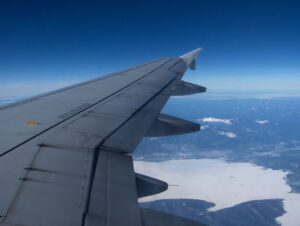
11:45 On the ground in LA. How long does it TAKE to open the door? “Go to Customer Service and they will help you find the LAN Chile desk,” offered the flight attendant. “I have no idea where it is.”
RUN. Ah, Customer Service desk. 27 people in line for one Customer Representative. Quick multiplication in my head. 27 people times a conservative 5 minutes each equals 135 minutes. Plane leaves in 50 minutes. I kept running.
Saw a uniform. “Help! I need to find LAN Chile! Can you help me?” Gentleman stops, yes he will help. “Tell them I’m here! Tell them I’m running!” He went away to make a call.
Back. “I cannot get through to them. You should go directly to the desk.” He kindly walked with me down the escalator, to the door, motioned towards the shuttle bus. “Oh, that one is just leaving, there’ll be another in 10 minutes,” he said. “I don’t have 10 minutes to spare!” He pointed left, drew me a diagram, “It’s only a 5-minute walk.” ANOTHER BUILDING. A different terminal entirely!
I began running (in my best slow hobble-walk), pulling my sturdy TravelPro carryon with the in-line skate wheels that drives like a dream. I’m running backwards in the alphabet, according to the overhead signs. From United. By the time I got to Delta my chest was pounding and I was drenched in sweat. Finally then, American! The end of the terminal. Open spaces. Next building.
It was stinky. Really stinky. Cigarette puffers lined the route, nervously sucking and blowing smoke, smoke, more smoke. There was a sign ahead. LAN. I bumped down the brick walkway, into the door, I’m on the wrong level! I need Departures and I’m still on the Arrivals tier. Elevator. Run.
I could see the counter! It was now 12:10 PM. I still had 25 minutes. But which line? Rows of tape separators on little chrome posts made a maze of pathways. A guard looked up to see if I’m a dangerous intruder. “LAN! For a 12:35 flight!” I waved my ticket in the air. The guard jumped up, ran, “Come with me!” I followed through the maze and he led me straight to the counter. Which was strangely empty. He called and someone appeared from behind a Do Not Enter door. He explained in Spanish. She shook her head. CLOSED. Plane is full.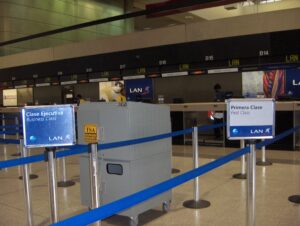
I explained in English. Plane was delayed from Seattle. Pant pant. Must get on this flight. Pant pant. Here is my ticket. Pant pant. Please help.
“Ees not my fault,” was her reply. How many times would I hear that statement before the day would end?
I spent 10 minutes begging to be allowed onto my plane. I spent 25 minutes waiting for the supervisor to return from the departure gate. Pregnant and obviously tired from the morning rush, she kindly described to me the details of why it took 3 hours to board – security, holding pen, many busloads to departure area, on and on. “Please come back manana,” she concluded. “We’ll try to get you on. But, eet too is full so, maybe not happen.”
I called Norwegian Cruise Lines in New York and explained what happened. “Please help me,” I implored. “Well, it’s not our fault that you missed your flight,” was the answer. “The trip officially begins in LA.” “I have trip insurance,” I stated. “What will it cover?” “Call the insurance company and see,” I was told.
I went outside and caught a shuttle back to the United counter. Waited in line for one hour. Finally reached the counter and Jo Anne, my first angel of the day. Jo Anne sold tickets, mostly to people who were “dis” connected, like me. She dealt with lots of tears. What flights go to Santiago? We can fly you to New York, and then to Miami, for tomorrow’s Santiago flight? No seats from Miami. We can fly you to Mexico City, then to Santiago? No seats from Mexico City. We can fly you to Toronto, then on Air Canada to Santiago? Seats available, but flight arrived too late to catch up to the Tour.
“I guess I’ll have to stay the night in LA,” I finally told her. “Can you get me a hotel voucher?” “Absolutely!” she assured me, and went away to do so. Meanwhile, beside me, a woman wept in French. They called for an agent who could converse with her. Passport expired, how could she get home? At least, I was close to home.
Jo Anne returned. She was in tears! Now I was the consoler. She could not get me a hotel voucher, she said. “And that’s not RIGHT! We delayed you and we should help you now. But my supervisor says it’s not our fault that you didn’t make the connection. They won’t help you!” “Don’t cry Jo Anne,” I replied, “you worked so hard to help me. It’s not your fault. Please don’t cry,” I repeated. “That’s such a beautiful pin you are wearing,” I said, an afterthought. Jo Anne smiled and wiped the tears from her cheeks, and then directed me to the bank of hotel phones.
Free Shuttle From the Airport. I selected a hotel that appeared to be nearby and made the call. “Go to the red zone,” I’m instructed, “we’ll pick you up.” Outside, the cigarette puffers are rowed like ducks, on assignment to leave no breath of fresh air for anyone passing by. I waited.
“Welcome to Los An-glees!” said my smiling driver, as he opened the door to the van. “Are you having a beautiful day?” “Yes,” I replied. My buddy the Downhome Philosopher espouses ‘never dump your problems on somebody else’s head.’ I agree with that thought. Why ruin the driver’s lovely day? “What are those towers ahead?” I asked. He described the towers of light, the palm trees; we were on Century Boulevard, in his beautiful city.
Checked in, my room was a haven, cigarette free, noise free. But it was too late to call Kansas City, home of my travel insurance company. It was too late to call New York, home to my cruise line. I flopped onto the bed, and fell asleep.
No! I’ve had no food today! 6 PM! Fourteen hours since I had my cup of Starbucks and my muffin. I’m starved. I could see Casa Gamiño from my window. I washed my face and went to eat.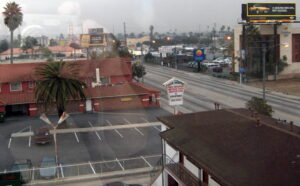
Inside, it was warm, walls were soft adobe coral, trimmed in hacienda green, Christmas decorations everywhere. “Good evening Senora,” as I was seated. I ordered #5, chilies rellaño. Chips were set before me, laughter was behind me. The music was playing, a Spanish song of happiness, I could tell, even though I did not understand the words.
This was the first day of my trip to Antarctica.
» posted on Monday, September 7th, 2020 by Linda Lou Burton
Know Your Neighbors 2 – South America
September 7, 2020, Linda Lou Burton posting from Little Rock, Arkansas – A little more 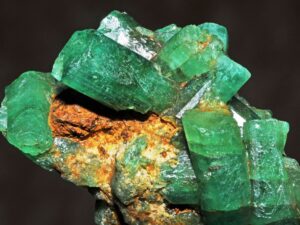 detail on the twelve countries of South America. Which country has the largest military budget? Which country has the lowest per capita GDP? Which countries have emeralds and diamonds? Which country has Dutch as their official language? In which country is life expectancy for females the highest? In which country is life expectancy for males the lowest? In which country do the most people claim to be Catholic? How well do you know your neighbors?
detail on the twelve countries of South America. Which country has the largest military budget? Which country has the lowest per capita GDP? Which countries have emeralds and diamonds? Which country has Dutch as their official language? In which country is life expectancy for females the highest? In which country is life expectancy for males the lowest? In which country do the most people claim to be Catholic? How well do you know your neighbors?
Countries in South America
- Argentina
- Bolivia
- Brazil
- Chile
- Colombia
- Ecuador
- Guyana
- Paraguay
- Peru
- Suriname
- Uruguay
- Venezuela
Argentina, Capital City Buenos Aires
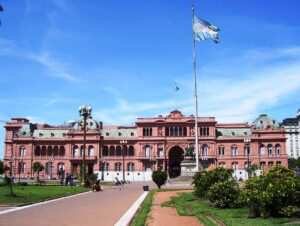 Argentina, the third largest South American country by population (45,089,492), is a presidential republic with a president as head of state and head of government. The official language is Spanish and the country is 77% Catholic and 11% Protestant and 7% Agnostic. The defense budget is $4.2 billion and there are 74,200 active troops. Natural resources are lead, copper, iron ore, petroleum. The Per Capita GDP is $20,567. Compulsory education ages 4-17. Life expectancy female 81.0; male 74.5.
Argentina, the third largest South American country by population (45,089,492), is a presidential republic with a president as head of state and head of government. The official language is Spanish and the country is 77% Catholic and 11% Protestant and 7% Agnostic. The defense budget is $4.2 billion and there are 74,200 active troops. Natural resources are lead, copper, iron ore, petroleum. The Per Capita GDP is $20,567. Compulsory education ages 4-17. Life expectancy female 81.0; male 74.5.
Bolivia, Capital City La Paz
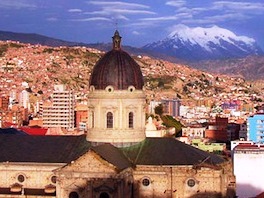 Bolivia, the eighth largest South American country by population (11,473,676), is a presidential republic with a president as head of state and head of government. The primary language is Spanish and the country is 79% Catholic and 9% Protestant. The defense budget is $533 million and there are 34,100 active troops. Natural resources are natural gas, iron ore, petroleum, timber. The Per Capita GDP is $7,859. Compulsory education ages 4-17. Life expectancy female 73.1; male 67.3.
Bolivia, the eighth largest South American country by population (11,473,676), is a presidential republic with a president as head of state and head of government. The primary language is Spanish and the country is 79% Catholic and 9% Protestant. The defense budget is $533 million and there are 34,100 active troops. Natural resources are natural gas, iron ore, petroleum, timber. The Per Capita GDP is $7,859. Compulsory education ages 4-17. Life expectancy female 73.1; male 67.3.
Brazil, Capital City Brasilia
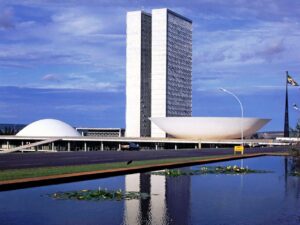 Brazil, the largest South American country by population (210,301,591), is a federal presidential republic with a president as head of state and head of government. The official language is Portuguese and the country is 65% Catholic, 14% Protestant, and 11% Independent. The defense budget is $28 billion and there are 334,500 active troops. Natural resources are gold, iron ore, petroleum, timber. The Per Capita GDP is $16,068. Compulsory education ages 4-17. Life expectancy female 78.2; male 71.0.
Brazil, the largest South American country by population (210,301,591), is a federal presidential republic with a president as head of state and head of government. The official language is Portuguese and the country is 65% Catholic, 14% Protestant, and 11% Independent. The defense budget is $28 billion and there are 334,500 active troops. Natural resources are gold, iron ore, petroleum, timber. The Per Capita GDP is $16,068. Compulsory education ages 4-17. Life expectancy female 78.2; male 71.0.
Chile, Capital City Santiago
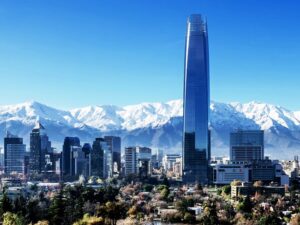 Chile, the sixth largest South American country by population (18,057,855), is a presidential republic with a president as head of state and head of government. The official language is Spanish and the country is 61% Catholic, 22% Independent, and 9% Agnostic. The defense budget is $4.2 billion and there are 77,200 active troops. Natural resources are copper, timber, nitrates, hydropower. The Per Capita GDP is $25,284. Compulsory education ages 5-17. Life expectancy female 82.4; male 76.2.
Chile, the sixth largest South American country by population (18,057,855), is a presidential republic with a president as head of state and head of government. The official language is Spanish and the country is 61% Catholic, 22% Independent, and 9% Agnostic. The defense budget is $4.2 billion and there are 77,200 active troops. Natural resources are copper, timber, nitrates, hydropower. The Per Capita GDP is $25,284. Compulsory education ages 5-17. Life expectancy female 82.4; male 76.2.
Colombia, Capital City Bogota
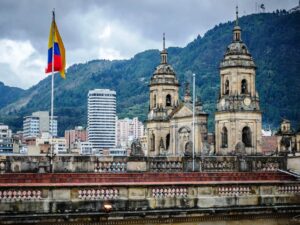 Colombia, the second largest South American country by population (48,631,464), is a presidential republic with a president as head of state and head of government. The official language is Spanish and the country is 86% Catholic, 9% Protestant, and 3% Agnostic. The defense budget is $10.6 billion and there are 292,200 active troops. Natural resources are copper, emeralds, hydropower. The Per Capita GDP is $14,999. Compulsory education ages 5-14. Life expectancy female 79.7; male 73.3.
Colombia, the second largest South American country by population (48,631,464), is a presidential republic with a president as head of state and head of government. The official language is Spanish and the country is 86% Catholic, 9% Protestant, and 3% Agnostic. The defense budget is $10.6 billion and there are 292,200 active troops. Natural resources are copper, emeralds, hydropower. The Per Capita GDP is $14,999. Compulsory education ages 5-14. Life expectancy female 79.7; male 73.3.
Ecuador, Capital City Quito
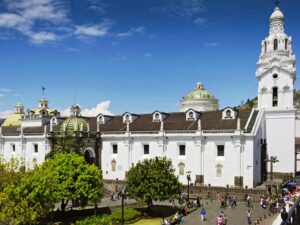 Ecuador, the seventh largest South American country by population (16,703,254), is a presidential republic with a president as head of state and head of government. The official language is Spanish and the country is 84% Catholic, 11% Protestant, and 4% Agnostic. The defense budget is $1.7 billion and there are 40,250 active troops. Natural resources are petroleum, fish, timber, hydropower. The Per Capita GDP is $11,714. Compulsory education ages 3-17. Life expectancy female 80.5; male 74.4.
Ecuador, the seventh largest South American country by population (16,703,254), is a presidential republic with a president as head of state and head of government. The official language is Spanish and the country is 84% Catholic, 11% Protestant, and 4% Agnostic. The defense budget is $1.7 billion and there are 40,250 active troops. Natural resources are petroleum, fish, timber, hydropower. The Per Capita GDP is $11,714. Compulsory education ages 3-17. Life expectancy female 80.5; male 74.4.
Guyana, Capital City Georgetown
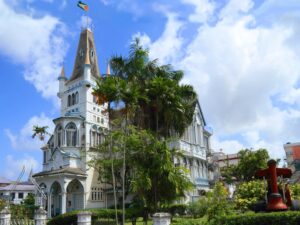 Guyana, the eleventh largest South American country by population (744,845), is a parliamentary republic with a president as head of state and head of government. The official language is English and the country is 34% Protestant, 30% Hindu, 11% Independent, and 8% Muslim. The defense budget is $56 million and there are 3,400 active troops. Natural resources are bauxite, diamonds, timber, shrimp. The Per Capita GDP is $8,569. Compulsory education ages 6-11. Life expectancy female 72.4; male 66.2.
Guyana, the eleventh largest South American country by population (744,845), is a parliamentary republic with a president as head of state and head of government. The official language is English and the country is 34% Protestant, 30% Hindu, 11% Independent, and 8% Muslim. The defense budget is $56 million and there are 3,400 active troops. Natural resources are bauxite, diamonds, timber, shrimp. The Per Capita GDP is $8,569. Compulsory education ages 6-11. Life expectancy female 72.4; male 66.2.
Paraguay, Capital City Asuncion
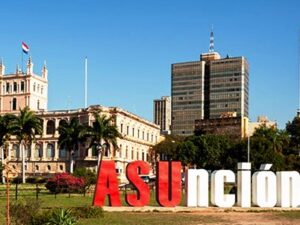 Paraguay, the ninth largest South American country by population (7,108,524), is a presidential republic with a president as head of state and head of government. The official languages are Spanish and Guarani and the country is 85% Catholic, 11% Protestant. The defense budget is $313 million and there are 11,500 active troops. Natural resources are hydropower, timber, limestone. The Per Capita GDP is $13,571. Compulsory education ages 5-17. Life expectancy female 80.5; male 75.0.
Paraguay, the ninth largest South American country by population (7,108,524), is a presidential republic with a president as head of state and head of government. The official languages are Spanish and Guarani and the country is 85% Catholic, 11% Protestant. The defense budget is $313 million and there are 11,500 active troops. Natural resources are hydropower, timber, limestone. The Per Capita GDP is $13,571. Compulsory education ages 5-17. Life expectancy female 80.5; male 75.0.
Peru, Capital City Lima
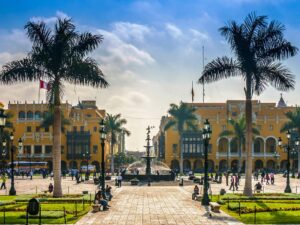 Peru, the fifth largest South American country by population (31,624,207), is a presidential republic with a president as head of state and head of government. The official languages are Spanish, Quechua and Aymara and the country is 84% Catholic, 12% Protestant. The defense budget is $2.3 billion and there are 81,000 active troops. Natural resources are copper, petroleum, fish, coal. The Per Capita GDP is $14,393. Compulsory education ages 3-16. Life expectancy female 76.7; male 72.3.
Peru, the fifth largest South American country by population (31,624,207), is a presidential republic with a president as head of state and head of government. The official languages are Spanish, Quechua and Aymara and the country is 84% Catholic, 12% Protestant. The defense budget is $2.3 billion and there are 81,000 active troops. Natural resources are copper, petroleum, fish, coal. The Per Capita GDP is $14,393. Compulsory education ages 3-16. Life expectancy female 76.7; male 72.3.
Suriname, Capital City Paramaribo
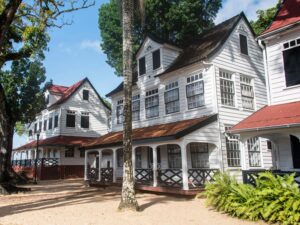 Suriname, the smallest South American country by population (603,823), is a presidential republic with a president as head of state and head of government. The official language is Dutch though English is widely spoken, and the country is 30% Catholic, 20% Hindu, 16% Muslim, 15% Protestant, 5% Agnostic . The defense budget is NA and there are 1,840 active troops. Natural resources are timber, hydropower, fish, gold. The Per Capita GDP is $15,498. Compulsory education ages 7-12. Life expectancy female 75.6; male 70.6.
Suriname, the smallest South American country by population (603,823), is a presidential republic with a president as head of state and head of government. The official language is Dutch though English is widely spoken, and the country is 30% Catholic, 20% Hindu, 16% Muslim, 15% Protestant, 5% Agnostic . The defense budget is NA and there are 1,840 active troops. Natural resources are timber, hydropower, fish, gold. The Per Capita GDP is $15,498. Compulsory education ages 7-12. Life expectancy female 75.6; male 70.6.
Uruguay, Capital City Montevideo
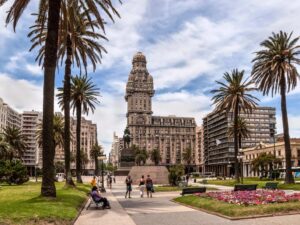 Uruguay, the tenth largest South American country by population (3,378,471), is a presidential republic with a president as head of state and head of government. The official language is Spanish and the country is 52% Catholic, 30% Agnostic, 9% Protestant, 7% Atheist. The defense budget is $486 million and there are 21,000 active troops. Natural resources are hydropower, fish, minor minerals. The Per Capita GDP is $23,531. Compulsory education ages 4-17. Life expectancy female 81.0; male 74.6.
Uruguay, the tenth largest South American country by population (3,378,471), is a presidential republic with a president as head of state and head of government. The official language is Spanish and the country is 52% Catholic, 30% Agnostic, 9% Protestant, 7% Atheist. The defense budget is $486 million and there are 21,000 active troops. Natural resources are hydropower, fish, minor minerals. The Per Capita GDP is $23,531. Compulsory education ages 4-17. Life expectancy female 81.0; male 74.6.
Venezuela, Capital City Caracas
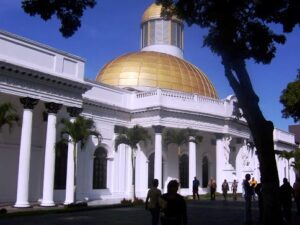 Venezuela, the fourth largest South American country by population (32,068,672), is a federal presidential republic with a president as head of state and head of government. The official language is Spanish and the country is 81% Catholic, 11% Protestant, 5% Agnostic. The defense budget is $741 million and there are 123,000 active troops. Natural resources are petroleum, gold, hydropower, diamonds. The Per Capita GDP is $18,102. Compulsory education ages 3-18. Life expectancy female 79.5; male 73.4.
Venezuela, the fourth largest South American country by population (32,068,672), is a federal presidential republic with a president as head of state and head of government. The official language is Spanish and the country is 81% Catholic, 11% Protestant, 5% Agnostic. The defense budget is $741 million and there are 123,000 active troops. Natural resources are petroleum, gold, hydropower, diamonds. The Per Capita GDP is $18,102. Compulsory education ages 3-18. Life expectancy female 79.5; male 73.4.
Resource: The World Almanac and Book of Facts 2020
» posted on Sunday, September 6th, 2020 by Linda Lou Burton
Know Your Neighbors – South America
September 6, 2020, Linda Lou Burton posting from Little Rock, Arkansas – Do you know your geography? There are twelve countries in South America – I keep up with them by memorizing them alphabetically.
- Argentina
- Bolivia
- Brazil
- Chile
- Colombia
- Ecuador
- Guyana
- Paraguay
- Peru
- Suriname
- Uruguay
- Venezuela
Where do the most people live?
- Brazil – 210,301,591
- Colombia – 48,631,464
- Argentina – 45,089,492
- Venezuela – 32,068,672
- Peru – 31,624,207
- Chile – 18,057,855
- Ecuador – 16,703,254
- Bolivia – 11,473,676
- Paraguay – 7,108,524
- Uruguay – 3,378,471
- Guyana – 744,845
- Suriname – 603,823
If you had to walk across it, which county would take the longest? Which is largest in square miles?
- Brazil – 3,287,957
- Argentina – 1,073,518
- Peru – 496,225
- Colombia – 439,736
- Bolivia – 424,164
- Venezuela – 352,144
- Chile – 291,933
- Paraguay – 153,399
- Ecuador – 109,484
- Guyana – 83,000
- Uruguay – 68,037
- Suriname – 63,251
Which country has the highest percentage of internet users? Most technologically inclined?
- Chile – 82.3%
- Argentina – 74.3%
- Venezuela – 72.0%
- Uruguay – 68.3%
- Brazil – 67.5
- Paraguay – 65.0%
- Colombia – 62.3%
- Ecuador – 57.3%
- Peru – 52.5%
- Suriname – 48.9%
- Bolivia – 43.8%
- Guyana – 37.3%
Which country has the highest literacy rate? Percent of population able to read and write?
- Argentina – 99.1%
- Uruguay – 98.6%
- Venezuela – 97.1%
- Chile – 96.9%
- Suriname – 95.6%
- Colombia – 94.7%
- Paraguay – 94.7%
- Ecuador – 94.4%
- Peru – 94.1%
- Brazil – 92.6%
- Bolivia – 92.5%
- Guyana – 88.5%
Which country has the highest population density? How many people are there per square mile? Close to each other or lots of breathing space?
- Ecuador – 156
- Colombia – 121
- Venezuela – 94
- Brazil – 65
- Peru – 64
- Chile – 63
- Uruguay – 50
- Paraguay – 46
- Argentina – 43
- Bolivia- 27
- Guyana – 10
- Suriname – 10
Which country has had the most confirmed DEATHS from COVID19 in 2020 to date?
- Brazil – 126,960
- Peru – 29,976
- Colombia – 21,615
- Chile – 11,682
- Argentina – 10,179
- Bolivia – NA
- Ecuador – NA
- Guyana – NA
- Paraguay – NA
- Suriname – NA
- Uruguay – NA
- Venezuela – NA
Which country has had the most confirmed CASES of COVID19 reported in 2020 to date?
- Brazil – 4,147,794
- Peru – 691,575
- Colombia – 671,848
- Argentina – 488,007
- Chile – 425,541
- Bolivia – NA
- Ecuador – NA
- Guyana – NA
- Paraguay – NA
- Suriname – NA
- Uruguay – NA
- Venezuela – NA
Resources: World Almanac and Book of Facts 2020 and World Health Organization

